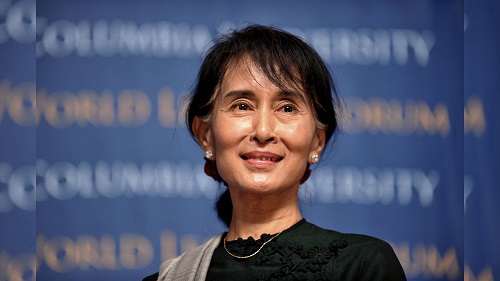This post has already been read 905 times!
Ousted Myanmar leader Aung San Suu Kyi has been moved from house arrest to solitary confinement in a prison compound in the military-built capital Naypyidaw, a junta spokesman said on Thursday.
The Nobel laureate, 77, left those premises only to attend hearings for her numerous trials in a junta court that could see her handed a prison sentence of more than 150 years.
On Wednesday, she was transferred from house arrest to “solitary confinement in prison”, junta spokesman Zaw Min Tun said in a statement.
Her future trial hearings would take place inside a newly-built courtroom inside the prison compound, he added.
A source with knowledge of the case said Suu Kyi’s domestic staff and her dog had not accompanied her when she was moved on Wednesday, and that security around the prison compound was “tighter than before”.
“Aung San Suu Kyi is in good health as far as we know,” they added, speaking on condition of anonymity.
Suu Kyi’s lawyers have been banned from speaking to the media, with journalists barred from her trial and the junta rebuffing requests by foreign diplomats to meet her.
“For the sake of the country and people, she (Suu Kyi) has sacrificed everything, but the wicked people are ungrateful and cruel,” one social media user posted on Facebook following Thursday’s announcement.
‘Punitive’
“What we are seeing is the Myanmar junta moving towards a much more punitive phase, towards Aung San Suu Kyi,” said Phil Robertson, deputy Asia director for Human Rights Watch.
“They are obviously trying to intimidate her and her supporters.”
Under a previous junta regime, Suu Kyi spent long spells under house arrest in her family mansion in Yangon, Myanmar’s largest city.
Under the current regime, she has already been convicted of corruption, incitement against the military, breaching Covid-19 rules and breaking a telecommunications law, with a court sentencing her to 11 years so far.
Suu Kyi turned 77 on Sunday and brought a birthday cake to court to eat with her lawyers ahead of a hearing on Monday, according to a source with knowledge of the matter.
The coup last year sparked widespread protests and unrest that the military has sought to crush by force.
Fighting has flared with established ethnic rebel groups in border areas, and across the country “People’s Defence Forces” have sprung up to fight junta troops.
According to local monitoring group Assistance Association for Political Prisoners, the crackdown has left more than 2,000 civilians dead while more than 14,000 have been arrested.



